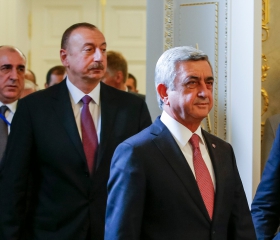On August 10, 2016, Vladimir Putin and Serzh Sargsyan met in Moscow. Mr. Sargsyan’s working visit to Moscow should not be considered as an isolated event as it was a part of a series of important meetings: on August 8, 2016 in Baku, President Putin met with Presidents of Azerbaijan and Iran; on August 9, Mr. Putin met with R. Erdogan in St. Petersburg; it was their first meeting after the Russian fighter plane being shot down in Syria. Thus, these meetings signify the countries’ attempt to look at the Greater Caucasus both from its inner dynamics point of view and considering such background factors as Russian-Turkish relations, the economic situation, energy security, and the effect the Middle Eastern crisis has on the situation in the Caucasus.
On August 10, 2016, Vladimir Putin and Serzh Sargsyan met in Moscow. Mr. Sargsyan’s working visit to Moscow should not be considered as an isolated event as it was a part of a series of important meetings: on August 8, 2016 in Baku, President Putin met with Presidents of Azerbaijan and Iran; on August 9, Mr. Putin met with R. Erdogan in St. Petersburg; it was their first meeting after the Russian fighter plane being shot down in Syria. Thus, these meetings signify the countries’ attempt to look at the Greater Caucasus both from its inner dynamics point of view and considering such background factors as Russian-Turkish relations, the economic situation, energy security, and the effect the Middle Eastern crisis has on the situation in the Caucasus.
Next year, Armenia enters an electoral cycle. The Russian factor will not be of primary importance (Armenians are primarily concerned with the country’s socioeconomic situation), yet it will be significant in the context of national security. Therefore, the two main points to consider about Mr. Putin and Mr. Sargsyan’s meeting are the regional factor and the factor of Russian-Armenian relations.
The escalation in Nagorno-Karabakh was a serious challenge that jolted Armenia, gave a great impetus to the sociopolitical movement in the contended territory, and made people think about the role of Russia and of the Russian-Azerbaijani relations. Besides the authorities, there is also the public, and this factor also was probably discussed.
Both Mr. Sargsyan and Mr. Aliev always pay close attention to the statements and promises Mr. Putin makes when meeting with the other party. It should be noted that Mr. Putin made similar statements on the Nagorno-Karabakh situation both in Baku and in Moscow. At the meeting with Mr. Sargsyan, Mr. Putin repeated almost verbatim his words spoken in Azerbaijan: Moscow does not envision this conflict resolved through a victory of one of the parties and through a lack of compromise between the states. Compromises and a struggle to achieve them are the foundation of stabilizing the situation. One can conclude that Russia prefers such a resolution of the conflict which will have no losers. Russia will balance between Armenia and Azerbaijan, try to shift the settlement into a diplomatic format and maintain it within that format so that it does not look like the victory of one party and the crushing defeat of the other.
There is much talk in Armenia now that Moscow will put pressure on Yerevan and that Armenia will be forced to make unfounded concessions so that Azerbaijan could join the EEU. The implication is that Moscow does not intend to force any country into the EEU and to turn it into a “Soviet pioneers” organization. If the conflict in Nagorno-Karabakh is not settled, Azerbaijan will not be able to become a full-fledged member of the EEU. This is why Moscow insists that the countries move to a compromise discussion via negotiations in bilateral or trilateral format.
Baku and Yerevan often attempt to view Russia’s policy only through the prism of “what is my advantage?” However, they forget that Moscow also wants to defend its interests and make decisions which are advantageous for it. Russia’s task is to prevent a conflict exploding near its borders. Today, Moscow is already taking an active part in settling other conflicts: in Syria, in Ukraine, in the North Caucasus, and it does not want any additional destabilization. This is why Russia tries to postpone its final decision, since should Moscow declare its clear support for either party, it might do so to its own detriment.
This is why this meeting is important primarily to rationalize the dialog and avoid unnecessary phobias. Another thing is that such work should be systematic, and the system is not there. It is important that presidential diplomacy does not become the only dialogue format between the Russian and Armenian political communities.
Besides, the meeting between Presidents Putin and Sargsyan is important not only from the processes in the Greater Caucasus point of view; it is also an important element of the Russian-Armenian relations. Both parties made statements that their relations are those between strategic allies, but it is apparent that both diplomats and politicians do not voice many things and that Russian-Armenian relations are being tested at this stage.
In the meantime, Russia’s role and one of this presidential meeting will hardly be of major importance for Mr. Sargsyan’s political career. Moscow supports Mr. Sargsyan and considers him to be an old partner. Yet at the same time, Moscow understands that it should be working with various Armenian politicians, and any of them should become a partner. This is why one could talk indirect support, and the Moscow factor in the future elections of the President or the Prime Minister of Armenia will not be critical; Armenian society has priority here.






